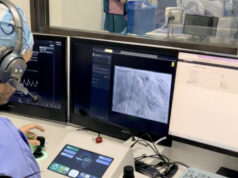
Steven P Sedlis (New York Veterans Affairs Healthcare Network, New York, USA) and others report in The New England Journal of Medicine that 15-year follow-up data from COURAGE (Clinical outcomes utilising revascularisation and aggressive drug evaluation) indicate that percutaneous coronary intervention (PCI) does not significantly improve survival compared with optimal medical therapy in patients with stable coronary artery disease. This is despite previous findings from COURAGE suggesting that there may be a late survival benefit with PCI.
In the COURAGE trial, patients with stable coronary artery disease were randomised to receive PCI with optimal medical therapy (1,149) or to optimal medical therapy alone (1,138). After a median of 4.6 years of follow-up, there were no significant differences between groups in the composite primary endpoint of all-cause death or non-fatal myocardial infarction. However, Sedlis et al report: “The survival curves appeared to separate at five years in favour PCI, which suggested that a late survival benefit with an initial management strategy of PCI may have emerged toward the end of the follow-up period.”
In this present analysis of the COURAGE data, Sedlis et al reviewed extended follow-up data for 1,211 patients from the study (approximately 53% of the original trial population). Of these, 613 were in the PCI group and 598 were in the medical therapy group. The authors report that, after a median follow-up of 11.9 years (range 0–15 years), there were 253 deaths (41%) in the PCI group and 253 (42%) in the medical therapy group—a non-significant difference: p=0.53. However, they note that the stent platform, device technology, and pharmacologic treatments used “were older and, in some cases, have been further refined and improved since the initiation of the trial; this type of limitation is common to all long-term outcome studies”. Sedlis et al explain that, during enrolment of the original COURAGE trial, there was “little use” of drug-eluting stents, coronary artery bypass grafting was “not a revascularisation option”, and there was “little, if any, use of invasive physiologic measurements” because fraction flow reserve was “still in its infancy” at the time.
They add that these, and other, limitations of the extended follow-up study underscore the importance of the ongoing ISCHEMIA (International study of comparative health effectiveness with medical and invasive approaches) trial, which is “currently evaluating whether, in patients with stable ischaemic heart disease and at least moderate ischaemia, an initial strategy of optimal medical therapy combined with cardiac catheterisation and contemporary revascularisation techniques reduces the death from cardiovascular causes or of myocardial infarction as compared with an initial conservation strategy of optimal medical therapy alone.”
Sedlis told Cardiovascular News: “Given the remarkable success of second-generation drug-eluting stents in safely reducing restenosis rates after PCI, it is important to test the hypothesis of the ISCHEMIA trial that contemporary revascularisation options provide a survival benefit for high risk stable ischemic heart disease patients”










